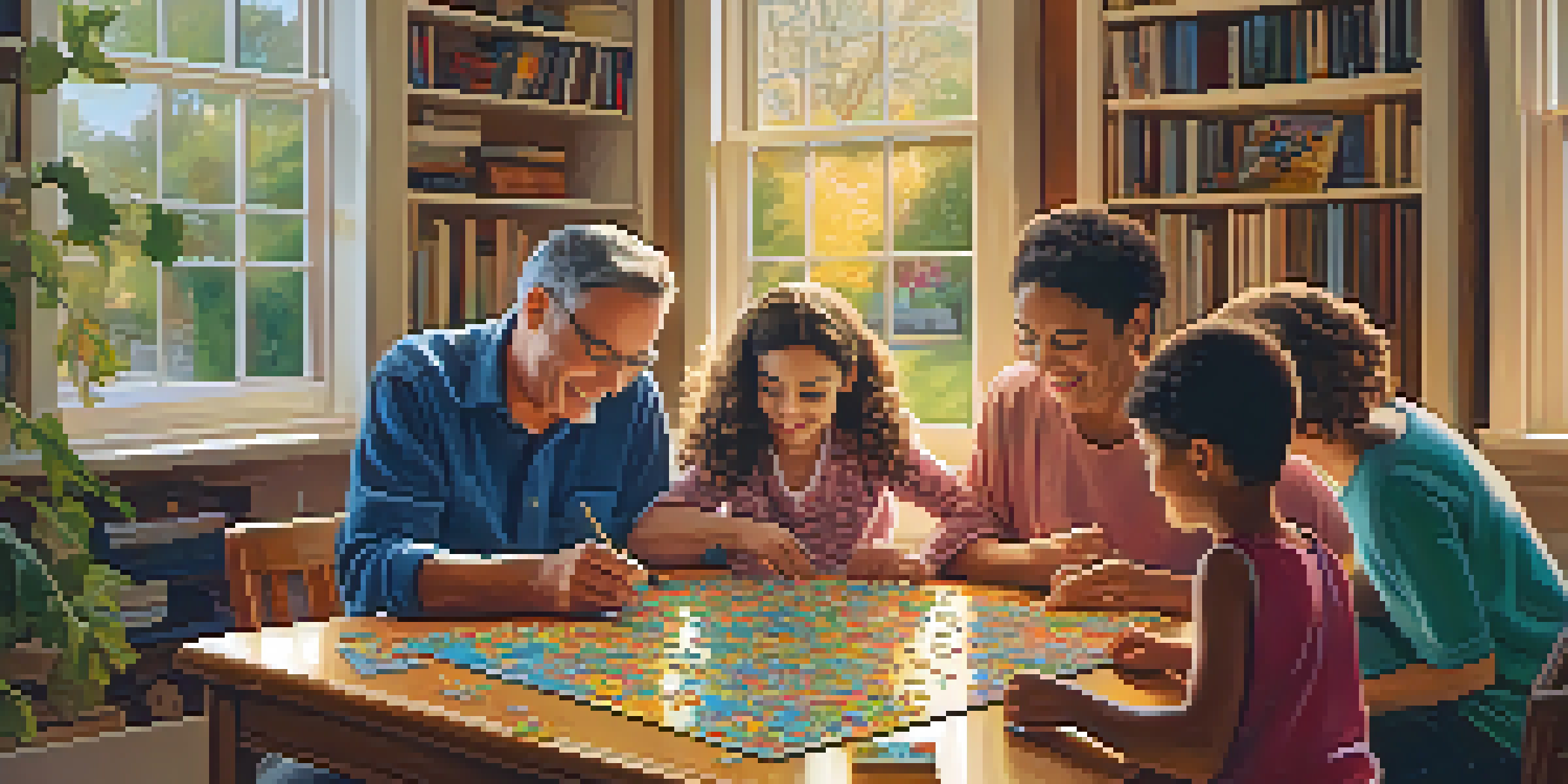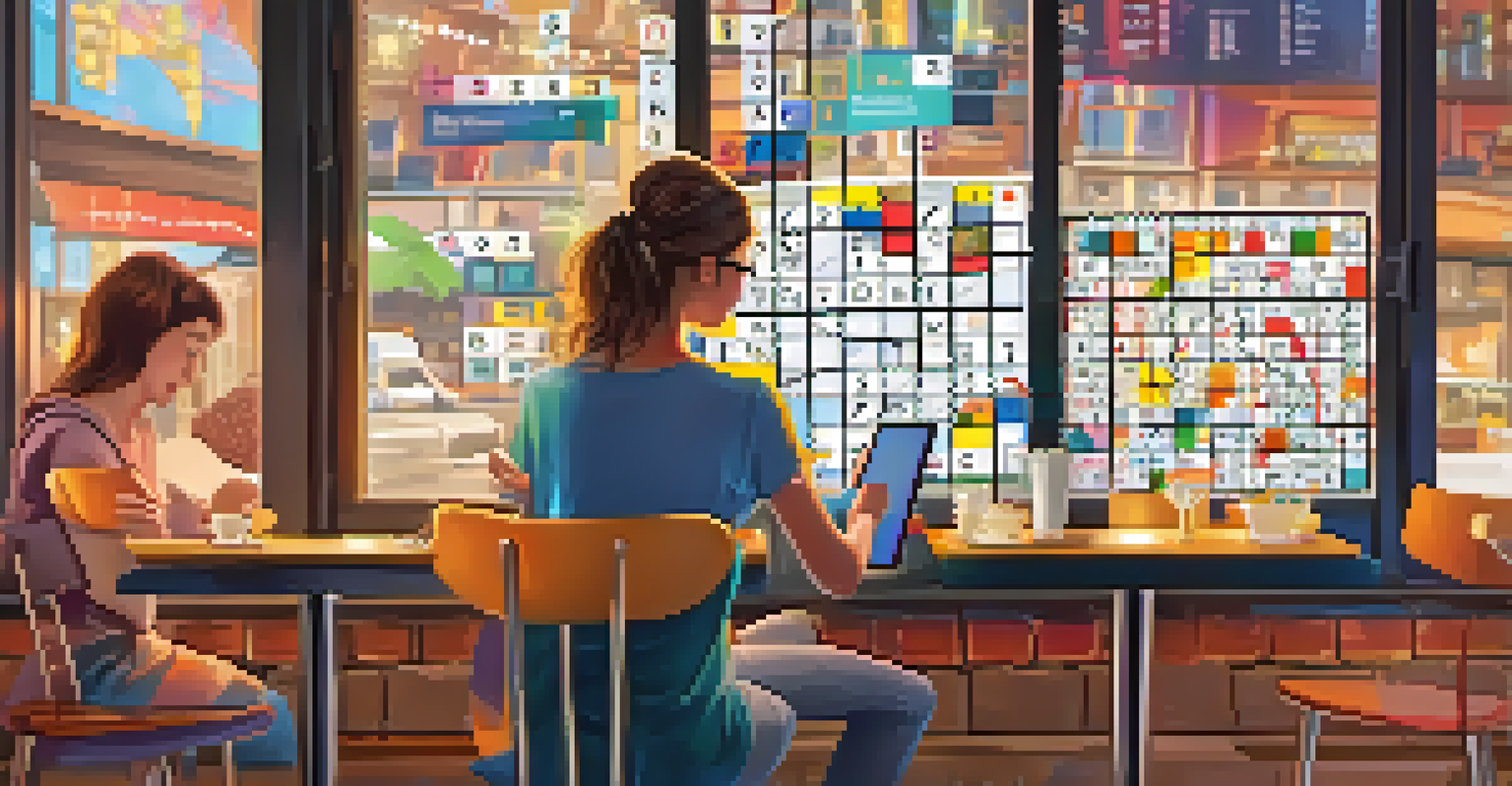The Psychology of Puzzle Solving: Why We Love It

The Intriguing Allure of Puzzles: An Overview
Puzzles have captivated humanity for centuries, appealing to all ages. Whether it's a jigsaw, crossword, or a Sudoku, the thrill of solving a puzzle is universal. This fascination stems from our innate desire to challenge ourselves and find solutions in a world filled with uncertainties.
Puzzles are not just games; they are a way to exercise our minds and strengthen our problem-solving abilities.
Many people find solace in the structure that puzzles provide. They offer a break from the chaos of daily life, allowing us to focus our minds and engage in a rewarding activity. This focus can lead to a state of flow, where we lose ourselves in the task and feel a sense of fulfillment.
Moreover, puzzles can also act as a form of escapism. They transport us to a world where we can exercise our problem-solving skills and experience a sense of achievement, making them a perfect antidote to stress.
Cognitive Benefits: How Puzzles Sharpen Our Minds
Engaging with puzzles is like a workout for our brains. They stimulate critical thinking, improve memory, and enhance cognitive skills, making them great tools for mental exercise. For instance, solving a crossword can expand vocabulary while Sudoku sharpens logical reasoning.

Research shows that regularly solving puzzles can delay cognitive decline as we age. It's akin to maintaining physical fitness; the more we challenge our minds, the better we function. This aspect of puzzle-solving can be particularly appealing as individuals seek ways to keep their minds sharp.
Puzzles Enhance Cognitive Skills
Engaging with puzzles stimulates critical thinking and memory, acting like a workout for our brains.
Additionally, the sense of accomplishment that comes from solving a challenging puzzle can boost our confidence. This positive reinforcement encourages us to tackle even tougher challenges, creating a cycle of growth and learning.
The Joy of Discovery: Unraveling the Mystery
One of the core reasons we enjoy puzzles is the thrill of discovery. Every piece we fit or clue we solve brings a moment of triumph, akin to uncovering a hidden treasure. This sense of revelation is deeply satisfying and speaks to our fundamental curiosity.
The joy of solving puzzles lies in the journey of discovery, not just the outcome.
As we progress through a puzzle, we gather pieces of information that help us see the bigger picture. This gradual unveiling mirrors problem-solving in real life, where incremental insights lead us to a solution. It's this journey of discovery that keeps us engaged and motivated.
Moreover, the joy of solving a puzzle often lies in the 'aha!' moment, where everything clicks into place. These moments of clarity are not just rewarding but also create a rush of dopamine, reinforcing our love for the activity.
Social Connections: Puzzles and Community
Puzzles also offer a unique opportunity for social interaction. Whether collaborating on a jigsaw with family or competing in a trivia night with friends, solving puzzles can bring people together. This communal aspect fosters bonding and creates shared memories.
Many people find that discussing strategies or sharing tips enhances the puzzle-solving experience. Online platforms and forums have emerged, allowing enthusiasts to connect and share their love for puzzles, further strengthening these social ties.
Puzzles Foster Social Connections
Working on puzzles together creates bonding experiences and shared memories among friends and family.
Additionally, the sense of camaraderie that develops while working on a puzzle can be incredibly rewarding. It's not just about the end result; the journey and connections we build along the way are equally valuable.
The Satisfaction of Completion: Fulfilling Our Goals
Completing a puzzle provides a sense of closure and accomplishment that is hard to replicate. It gives us a tangible outcome for our efforts, reinforcing the idea that persistence pays off. This feeling can be immensely satisfying, especially after spending time on a particularly tough challenge.
The completion of a puzzle often mirrors achieving personal goals in life. It requires patience, strategy, and resilience—qualities that are beneficial in various aspects of our lives. Celebrating these small victories can boost our motivation in other areas too.
Moreover, the act of finishing a puzzle can instill a sense of pride. It's a reminder that we are capable of overcoming challenges, which can be empowering and uplifting.
The Role of Technology: Digital Puzzles and Their Appeal
With the rise of technology, puzzles have evolved into digital formats, making them more accessible than ever. Online platforms and apps offer a plethora of options, from classic crosswords to innovative escape room games. This convenience caters to our busy lifestyles and allows us to engage with puzzles anytime, anywhere.
Digital puzzles can also enhance the experience through interactive features. Hints, timers, and community leaderboards introduce a competitive element that can heighten enjoyment and keep us engaged. This modern twist on traditional puzzle-solving taps into our desire for instant gratification.
Completion Brings Satisfaction
Finishing a puzzle provides a sense of accomplishment and closure, reinforcing the value of persistence.
However, the essence of puzzle-solving remains unchanged—it's still about challenge, engagement, and satisfaction. The blend of technology with our love for puzzles creates a dynamic experience that appeals to both new and seasoned enthusiasts.
Conclusion: The Enduring Appeal of Puzzle Solving
In summary, the psychology behind puzzle-solving reveals much about human nature. Our love for puzzles is intertwined with our need for cognitive stimulation, social connection, and a sense of achievement. They serve as a reminder of our capacity to think critically and creatively.
As we continue to engage with puzzles, we not only sharpen our minds but also foster relationships and create lasting memories. Whether it's a solitary challenge or a group activity, puzzles hold a special place in our hearts and lives.

Ultimately, the enduring appeal of puzzle-solving lies in its ability to make us feel alive, connected, and accomplished. So, the next time you tackle a puzzle, remember that you're part of a long tradition of curious, problem-solving minds.